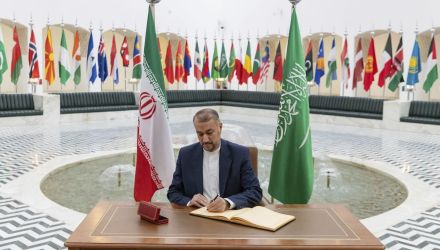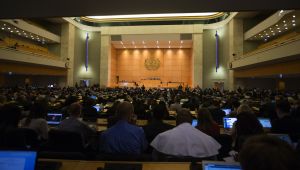IN FIFTH century China, there lived a monk named Tai Qin, who was intellectually savvy since childhood. Once the abbot asked a question: "There is a bell hanging on a tiger's neck; who can untie it?" Everyone was rendered speechless except little Tai Qin: "The one who tied the bell on the tiger can untie it."
The nuclear bell from North Korea has sounded strident for two years. Pyongyang's pursuit of nuclear weapons would not have taken place without the perceived threat of the United States. For better or worse, North Korea thinks the United States tied the bell around its neck. Washington, perceived to incite Pyongyang's nuclear ambition and in direct confrontation with North Korea's nuclear weapons program, must be the one to untie it.
Pyongyang already declared that it has nuclear weapons and is rumored to test a bomb this June. Such a step would make North Korea a full-fledged nuclear power operating outside of the nuclear non-proliferation regime.
The six-party talks that also include China, South Korea, Japan, and Russia, have been deadlocked since last June. North Korea rebuffed Washington's proposal for "complete, verifiable, and irreversible denuclearization" in return for a provisional security guarantee and the lifting of sanctions. Pyongyang's refusal to respond prompted flak from Washington with references to the state as an "outpost of tyranny," giving North Korea one more excuse to postpone a return to the talks.
North Korea continues to insist that America's hostile policy is the crux of the problem. The United States has branded North Korea as the major obstacle to resume the talks. China has been pressed into service by the United States to bring Pyongyang to the table, but this has not yet proven successful. A Chinese diplomat was quoted as saying that the unyielding position of the United States is the basic reason for the impasse.
In short, Washington's inflexibility and relentless rhetoric is preventing solution on the North Korean peninsula, and yet Washington is the only party that can bring about resolution.
Washington can, if it wishes, convince Pyongyang that there is nothing to fear from American primacy as long as it gives up its nuclear weapons. As the world superpower and leader in the globalized economy, the United States could lead an engagement policy that would bring security to the region and demonstrate opportunities for increased economic stability.
By being prepared to accept an initial freeze of Pyongyang's plutonium program without immediately insisting on its ultimate objective of "complete, verifiable, and irreversible denuclearization," the United States would accomplish the task of offering a viable solution for North Korea to save face, while reducing the tension building in the region. Additionally, bilateral contact between Washington and Pyongyang outside the six-party talks, similar to Jimmy Carter's visit to Pyongyang in the 1994 nuclear crisis, can help to break the ice. Chinese President Hu Jintao could pay a visit to Pyongyang, and South Korea could revive high-level dialogue with North Korea, but those efforts pale to any initiative by Washington. Only Washington can attempt to alleviate Kim Jong Il's deep sense of insecurity.
To the contrary, coercive measures from the United Nations or China will be the last straw for Pyongyang to escalate its nuclear ambitions, including an imminent nuclear test. With the world truly against them, North Korea will have little to lose by not flexing its nuclear muscle. Only sincerity and flexibility from Washington can bring Pyongyang back to talks and to negotiating disarmament for a reasonable price.
The other parties in the talks are watching Washington to decide their next course of action. Beijing has indicated its willingness to nudge North Korea further if Washington will put a package on the table that China believes is sufficient to ask Pyongyang to accept. As the world steps closer to the brink of a nuclear North Korea, it is the United States that must step forward to alleviate the situation. To be sure, the other parties in the talks must take their share of the responsibility for potential failure, but blame for a nuclear volatile Asia will surely fall on the intransigence of the party thought to have tied the bell around the tiger's neck in the first place.
Anne Wu is a fellow at the Belfer Center for Science and International Affairs at Harvard's Kennedy School of Government.
Wu, Xiaohui (Anne). “Avoiding a Nuclear North Korea.” The Boston Globe, May 22, 2005




